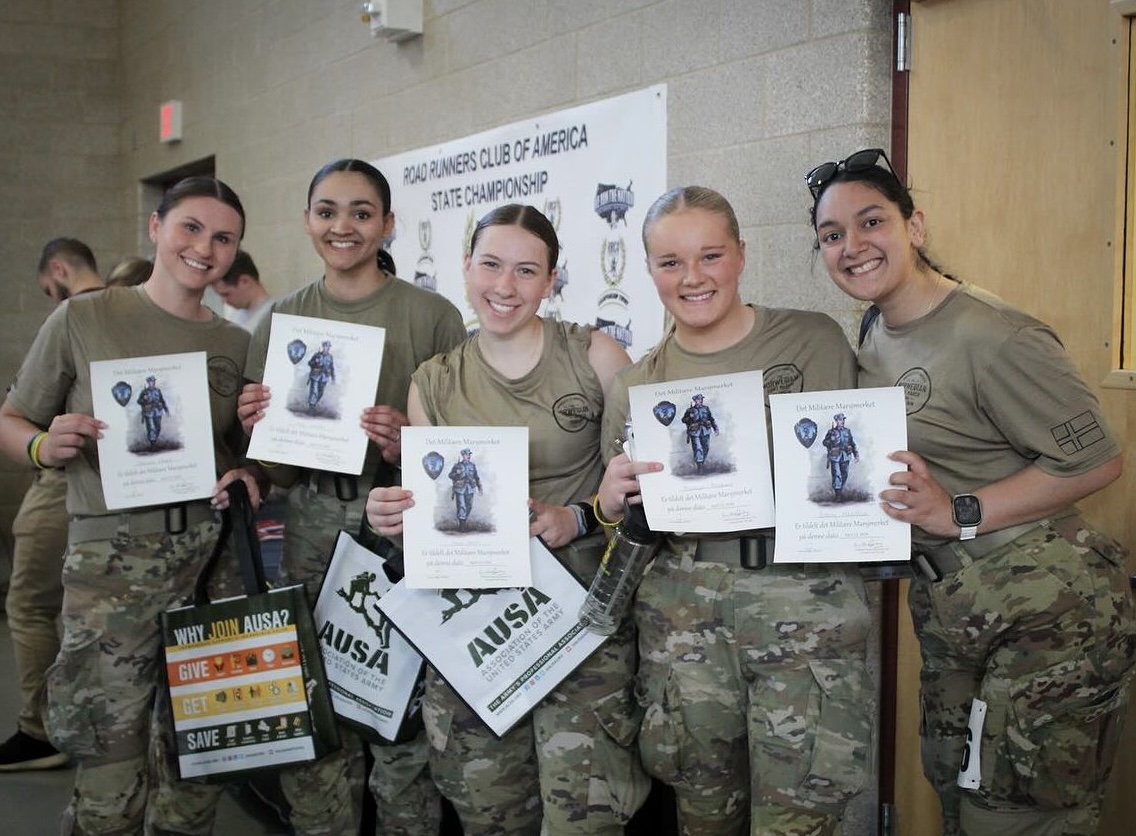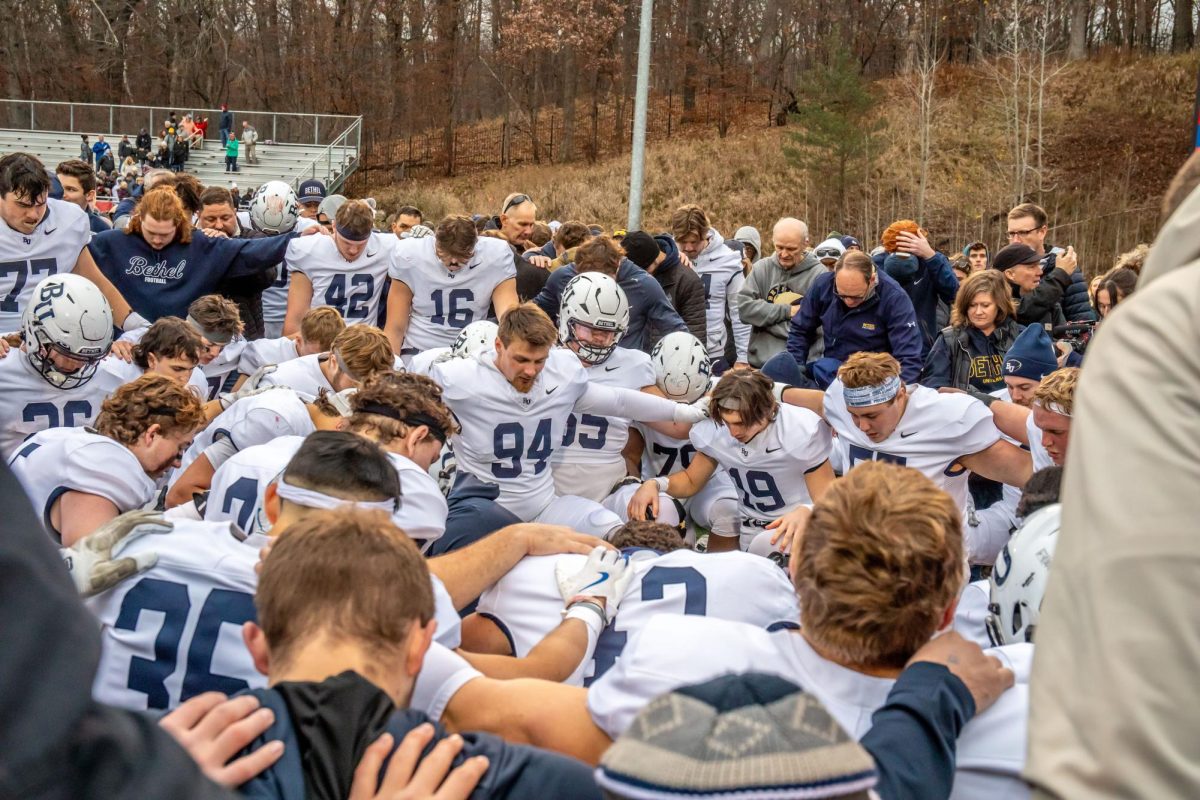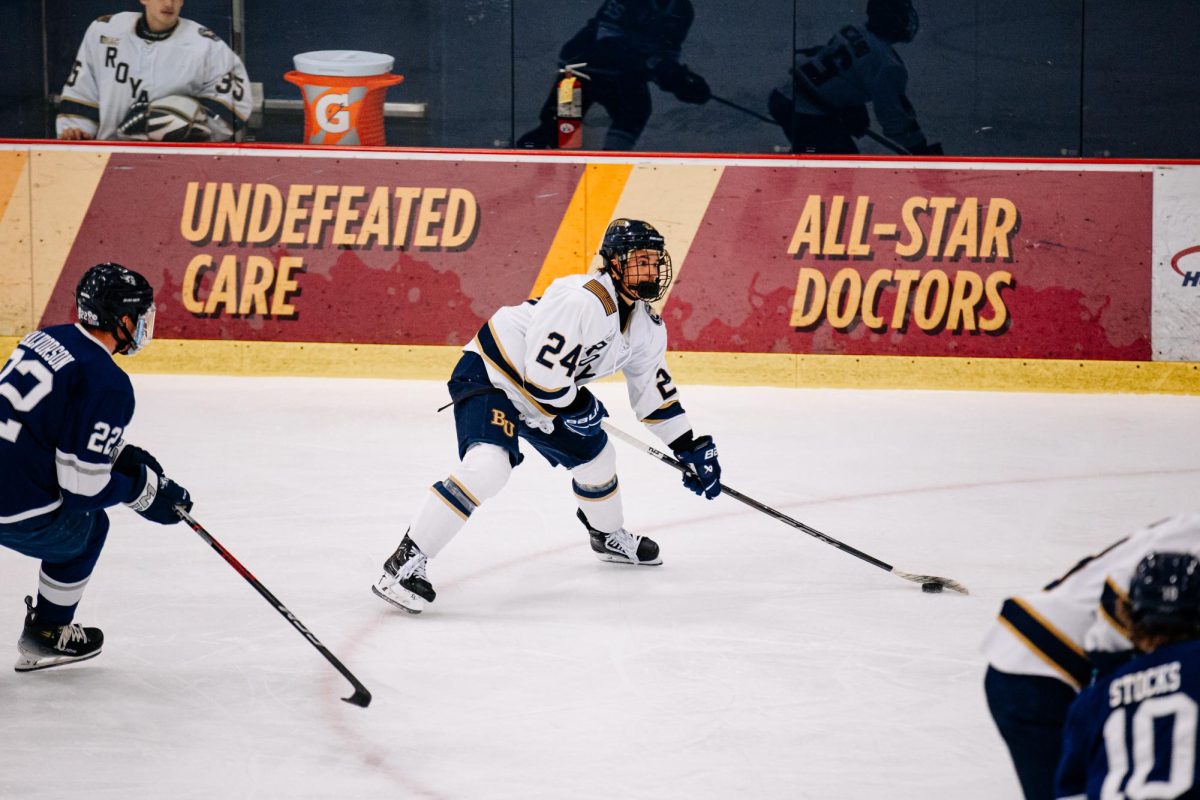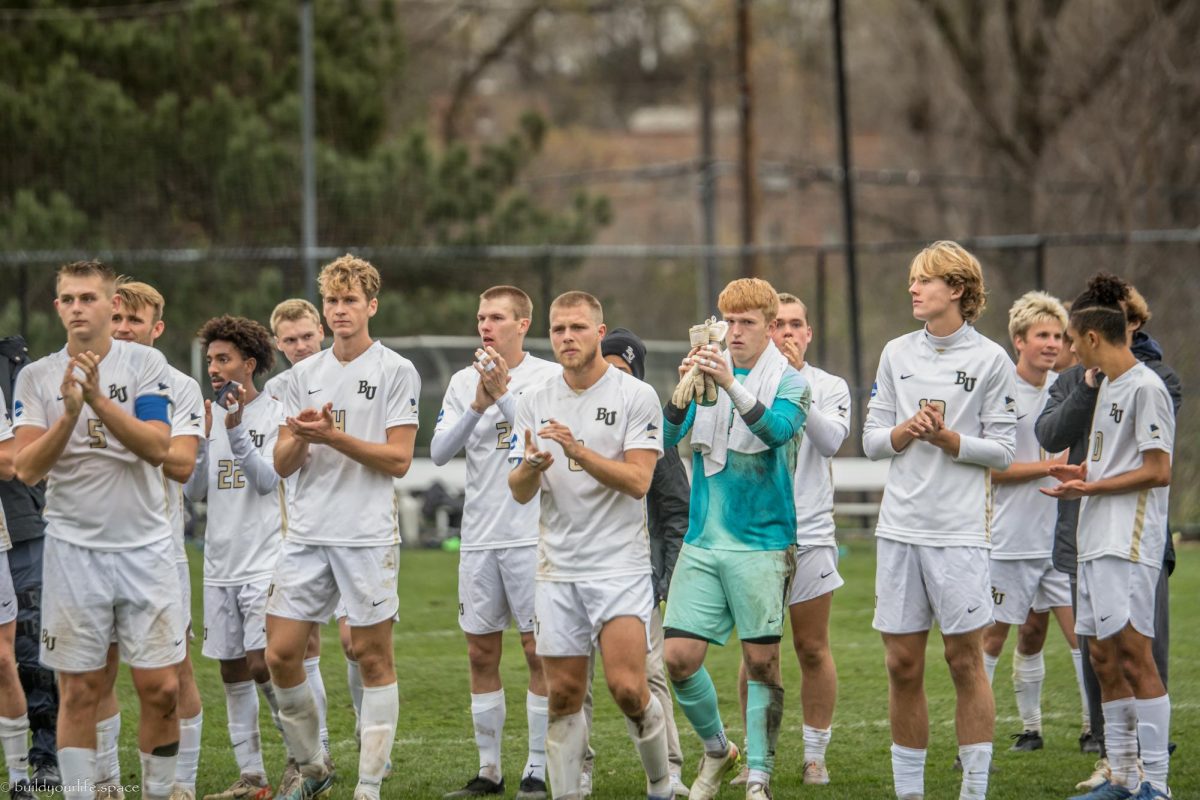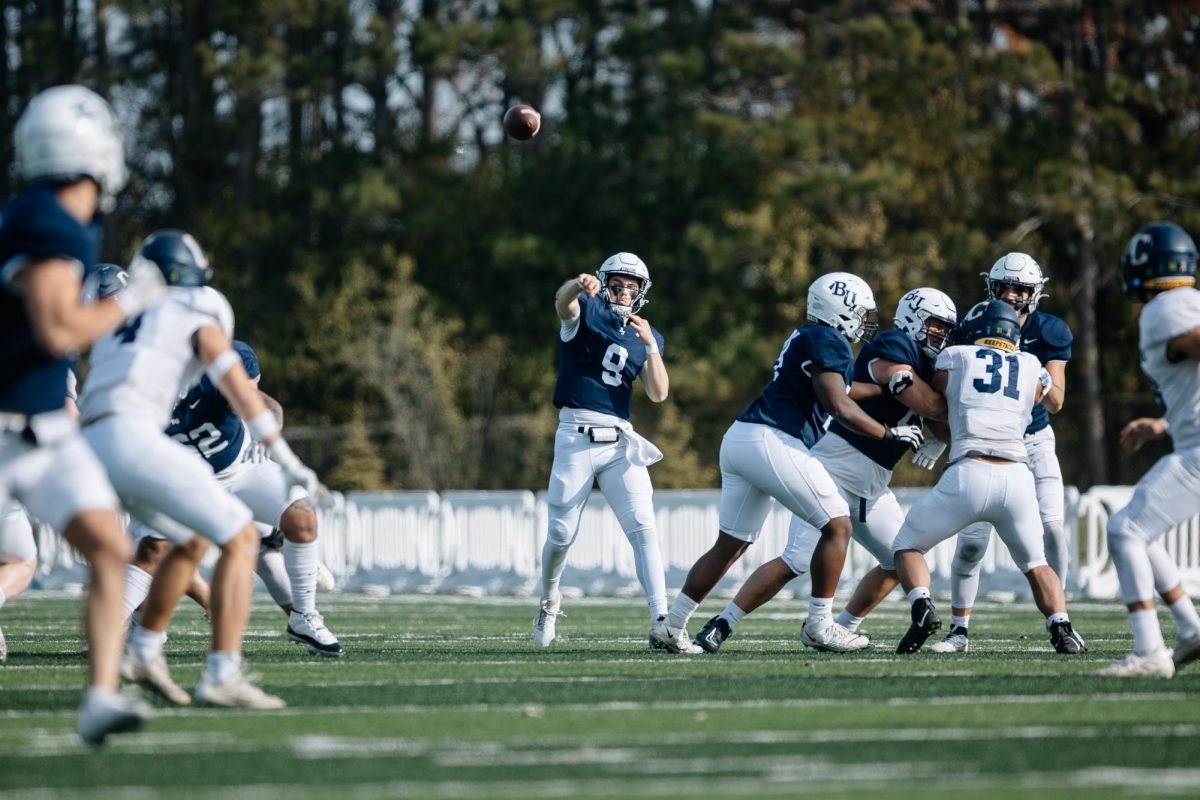This is a story about love, theology, fear and policy. It’s about honesty, change, discomfort and pain. It’s a story that’s been left untold.
By Jenny Hudalla
Esther Jones and Sarah Nelson contributed to this report. This was published in The Clarion 2014 – 2015.
Dan Sandberg’s breath froze in the air as he closed the door of the campus shuttle by the Robertson Center. His shift had just ended, and the bag of Totino’s Pizza Rolls in his freezer was calling his name. He had just begun to decide between sausage and pepperoni when the first snowball hit him square in the back.
With his hand over his head, Sandberg ducked between rows of cars and barreled into the safety of his vehicle. He has since tried to block out most of the gay slurs his harassers yelled at him that night.
Sandberg is a senior at Bethel University, where being gay is a reportable offense. Along with eating disorders, suicidal behavior and alcohol use, resident assistants must immediately report homosexuality to their hall directors and possibly Student Life deans.
While the university has chosen to engage with other social issues, hosting a #BlackLivesMatter panel discussion and establishing a gender studies minor, conversation about homosexuality and homophobia has been comparably quieter at the institutional level.
“There’s no discussion,” Sand- berg said. “It’s either ‘you’re a sinner’…or ‘let’s get close so we can fix you.’ It’s a really toxic environment.”
In its Covenant for Life Together, Bethel identifies homosexual behavior — along with adultery, idolatry and dishonesty, among others — as a character quality inconsistent with the Christian lifestyle. However, according to Executive Vice President and Provost Deb Harless, that doesn’t mean Bethel shouldn’t be a safe and welcoming place for LGBT students.
“Bethel University needs to be a place where all people, regardless of sexual orientation, are treated with love and respect,” Harless said.
The biggest thing for me is feeling like I’m not allowed to be a Christian because I’m gay. Daniel Sandberg
Reference to sexual orientation is, however, missing from the Covenant’s anti-discrimination clause. According to Harless, the university does not discriminate based on race, gender, age or disability, but it does reserve the right to discriminate based on sexual orientation in its hiring practices.
“As a religious institution, we are exempt from the provision of the Minnesota Human Rights Statute regarding employment,” Harless said.
For some LGBT students, Bethel’s stance on homosexuality doesn’t mean they are isolated or unsupported. But for Sandberg, all the policy communicates is that he’s not part of the in-crowd.
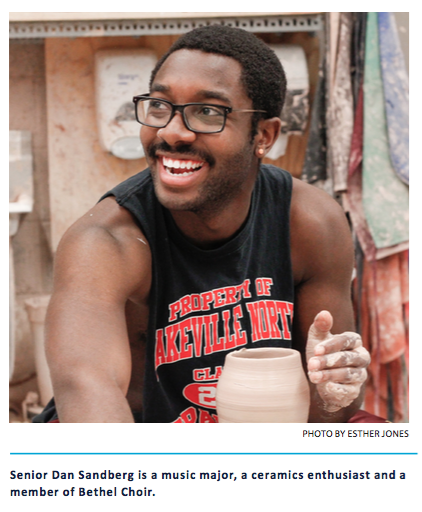 “The biggest thing for me is feeling like I’m not allowed to be a Christian because I’m gay,” Sandberg said. “Who are you to tell someone what they are allowed to do or be? That’s between them and God.”
“The biggest thing for me is feeling like I’m not allowed to be a Christian because I’m gay,” Sandberg said. “Who are you to tell someone what they are allowed to do or be? That’s between them and God.”
What it should mean for us is trying to create an atmosphere where young people can wrestle well and with integrity around the things that matter most to them. Laurel Bunker
Campus pastor Laurel Bunker heaved a sigh as she sat at the polished wooden table in her office, searching for the right words to describe her opinion on homosexuality at Bethel. She’s faced with a challenging balancing act — trying to uphold the traditional interpretation of Scripture while still showing love to gay students.
“We need to somehow create a level of honesty in talking about it, but that does not mean broad-range understanding or acceptance,” Bunker said. “What it should mean for us is trying to create an atmosphere where young people can wrestle well and with integrity around the things that matter most to them.”
While the university has approved subculture-based organizations like United Cultures of Bethel and Disability Awareness Group, Bethel is the only MIAC school without an official support group for LGBT students.
For gay students like Jonah Venegas, that’s OK. Although he said an on-campus support group would be “an incredible thing to have,” his relationships with students and faculty have been enough to make him feel safe and accepted.
“None of my friends are awkward about it. They’re not trying to skirt around things,” Venegas said. “No one has treated me differently since they’ve found out . . . if I need to talk, they’ve been super willing to listen.”
According to psychology professor and alumnus Joel Frederickson, animosity toward LGBT students has abated over the last few decades. He pointed to numbers from a 2008 national survey that revealed 10.3 percent of Bethel’s incoming first-year students believed same-sex couples should have the right to legal marital status. By the time those students were seniors, that number had risen to 48.6 percent. It was the largest perspective shift on the entire survey.
While more than half of students surveyed still opposed same-sex marriage, Bunker said widespread approval isn’t necessary to feel secure in one’s identity. She’s faced plenty of criticism for her role as a female pastor, but she doesn’t doubt God’s purpose for her life.
“I don’t think that every person who wants to live their life as a gay person needs to have the affirmation of the entire church if they feel that somehow this is the life they are called to live,” Bunker said. “I would question that and challenge that, but . . . we have to be really careful about what we’re presupposing is necessary for people to feel as though they can function.”
Curtiss DeYoung raised his eyebrows at the student sitting across from him, trying to decide how to answer the question that had just been posed by a Bethel sophomore. After a brief pause, he responded with another question.
“Do I think homosexuality is a sin?” DeYoung repeated. “Does that stay in this office?”
His response highlights a deep-seated fear among faculty members to speak publicly about homosexuality — a fear that DeYoung, a former reconciliation studies professor, said still exists on Bethel’s campus.
DeYoung cited the termination of sociology professor Ken Gowdy in 1991 as one of the reasons faculty and staff are reluctant, nearly 25 years later, to engage in conversation about homosexuality.
A 1991 edition of The Clarion reported Gowdy was released after telling a student he wasn’t sure homosexuality was a sin.
Harless said there isn’t a simple, yes-or-no answer to whether employees who express a view counter to the Covenant could be fired.
“Given that faculty sign the Covenant, which includes a statement about the university’s perspective on homosexual behavior, we would not expect a faculty member to advocate for a position that conflicts with the Covenant,” Harless said. “The response to a faculty member who seems to advocate for a position that contradicts the Covenant would be made carefully and thoughtfully.”
Almost a decade after Gowdy was released, an informal group of students called the Straight- Gay Reconcilers decided to offer faculty a small but significant way to support LGBT students by handing out “Safe Place” signs for professors to hang on their doors.
When English professor Joey Horstman posted one of the signs at the entrance of his third floor Academic Center office, it was gone by the following Tuesday morning. He replaced the sign five or six times. Then he gave up.
As part of its “Safe Place” campaign, the Straight-Gay Reconcilers conducted a survey to gauge student attitudes toward both the signs and the group itself. According to results published in a 2010 edition of The Clarion, 59 percent of 697 students polled believed the signs were unnecessary because the entire campus should be a safe place. Forty-three percent said Straight- Gay Reconcilers should not be allowed club status.
A 2012 article in Lavender Magazine reported that Bethel did not charter the Straight-Gay Reconcilers or allow them to advertise on campus.
Now, five years later, social psychologist and reconciliation studies professor Christena Cleveland said faculty, staff and even students are still waiting for administration to tell them it’s OK to openly talk about issues surrounding homosexuality and the church.
“I think in this community there’s so much taboo around [the topic] that it really does take the green light from leadership,” Cleveland said. “From the top — the provost, the president — the people who have the most power here.”
For DeYoung, that green light never came. While he tried to support LGBT students behind closed doors, remaining silent ultimately felt like an act of betrayal.
“As a person working for reconciliation, the school’s inability to have open dialogue and discussion of homosexuality — and its inability to allow students to be who they are — certainly was a contributing factor as I thought about leaving Bethel,” DeYoung said.
I felt very trapped in a place where I couldn’t express who I was or what I was feeling. Elizabeth Ciesluk
He resigned from his position as co-chair of the anthropology, sociology and reconciliation studies department in January 2014. 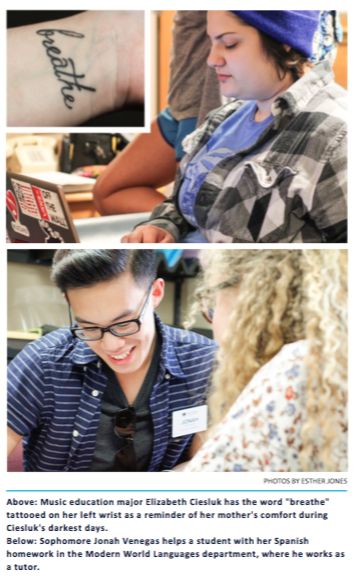 Music education major Elizabeth Ciesluk has the word “breathe” tattooed on her left wrist. The black, willowy letters are a constant reminder of her mother’s comfort during her darkest days: Breathe in the good. Breathe out the bad.
Music education major Elizabeth Ciesluk has the word “breathe” tattooed on her left wrist. The black, willowy letters are a constant reminder of her mother’s comfort during her darkest days: Breathe in the good. Breathe out the bad.
It’s Ciesluk’s second year at Bethel, and she almost didn’t come back. Ready to “get out” after her first two semesters, Ciesluk planned to transfer to Gustavus Adolphus — another MIAC school that has a strong music department and a gay-straight alliance group.
“I felt very trapped in a place where I couldn’t express who I was or what I was feeling,” she said. “I was ready to move on to somewhere where I knew that there was a lot more acceptance.”
One Friday afternoon last year, Ciesluk had just plopped into her favorite leather chair in the Clausen Center lounge when a student in the adjacent pod of chairs asked his friend whether sexual orientation was a choice. The second student responded with an unequivocal “Yes.”
Ciesluk’s fists clenched.
“If that were the case, I’d probably be the straightest person on the planet,” she said. “I loved being in the church growing up, I loved learning about Christ and I still had these feelings toward women that I could not control.”
Both Venegas and Sandberg agree that being gay isn’t a choice. Venegas said he almost had “to be slapped in the face” to come to terms with his identity, and Sandberg can’t imagine signing up for the pain he’s experienced.
Because he’s an openly gay student, Sandberg said people have picked up their things and left to avoid sitting next to him. Male students have ignored his greetings because they’re afraid he’s trying to make a pass at them. He feels unwanted.
“If this were a choice, do you think I would choose to be lonely, miserable and rejected by my family and friends?” Sandberg said. “No. I would not choose to be that way.”
Venegas realized he was gay three years ago, when he was sitting in the basement of Bethlehem Baptist Church on a Sunday morning. After listening to a friend’s youth group testimony about same-sex attraction, Venegas was finally able to put his feelings into words.
He believed he was called to celibacy until just this year, when he was engulfed by crippling feelings of depression. Hardly able to get out of bed or dress himself, Venegas was terrified by the thought of a life time alone.
He started praying for hours every day, writing letters to God and asking Him to take away his longing for a male partner. When no relief came, Venegas finally began considering the possibility of a God-honoring homosexual relationship.
“I really don’t think the Bible is as clear in regards to this as a lot of people think it is,” Venegas said. “For me, I think it comes down to praying a lot and making relationships with people who identify as LGBT to figure out where God is calling me on this.”
According to DeYoung, who now serves as the executive director of a faith-based non-profit organization in Chicago, there are theological inconsistencies in the university’s hiring practices. While Bethel hires divorced and remarried faculty and staff, it does not hire people who identify as gay.
Just as dancing and alcohol were once condemned in the Covenant, so too was remarriage considered adultery. But as perspectives have changed, DeYoung said, Bethel “chose grace on these matters.”
“I hope Bethel will also choose to extend its affirmation to LGBT folks,” DeYoung said. “There’s no better time than right now, given the changes happening in the broader society. Too often, the church is behind.”
But, for Bunker, an imminent change in policy is hard to foresee. While she said Bethel should continually strive to live in Chris an community with LGBT students, there isn’t much wiggle room when it comes to the university’s stance on homosexual behavior.
“Bethel represents an evangelical community that has made its commitment to biblical fidelity clear in terms of its under- standing of the Scriptures,” Bunker said. “Do I think Bethel will change its position on homosexuality? Not anytime soon.”
The moonlight glistened across Lake Valentine as Sandberg walked toward Seminary Hill with another student. At half past one in the morning, they had been talking for more than two hours.
“I don’t know what it means to be gay and Christian,” the student told him.
Sandberg nodded. He’s still trying to figure the question out himself. But every time he questions his identity in Christ ,he feels a rush of divine love and affirmation that leaves him speechless.
While scenes like that are common in Sandberg’s life, many Bethel students struggle to reconcile the university’s stance against homosexual behavior with the presence of gay students on campus. In Bunker’s experience, students are often left with the same question.
“When you are a [gay student] and you read that Covenant, why do you still choose to come to a place where you know there might be limited access to . . . an open community that affirms your lifestyle?” Bunker asked. “What draws you to Bethel?”
My purpose in being here has been to help those who are gay realize it’s not about who you love, it’s about how you love. Daniel Sandberg
For Ciesluk, it was Festival of Christmas. For Venegas, it was a positive PSEO experience. And for Sandberg, it was absolutely nothing — his parents forced him to attend.
While they have experienced different comfort levels at Bethel, Ciesluk, Venegas and Sandberg all chose to stay.
“My purpose in being here has been to help those who are gay realize it’s not about who you love, it’s about how you love,” Sandberg said. “People have come up to me and said that I’ve helped them by being myself, and that’s all I can ask for.”
Ciesluk, however, wants more than student-to-student support and quiet conversations with faculty. She wants instutional change, and she has two years left to make it happen. While she hopes to start an official support group for LGBT students next year, Ciesluk said her long-term goal is to help Bethel become more “knowledgeable and accepting of all.”
And Venegas? He just wants all Christians, both gay and straight, to remember to have the conversation about homosexuality in human terms.
“This isn’t an issue. This isn’t a debate. This is life for a lot of people,” Venegas said. “People with real lives and real stories and, a lot of the time, real pain.”






